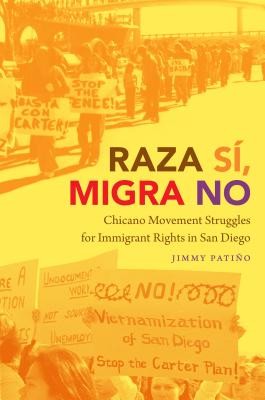
- We will send in 10–14 business days.
- Author: Jimmy Patiño
- Publisher: University of North Carolina Press
- ISBN-10: 1469635569
- ISBN-13: 9781469635569
- Format: 17 x 23 x 2.3 cm, minkšti viršeliai
- Language: English
- SAVE -10% with code: EXTRA
Reviews
Description
As immigration from Mexico to the United States grew through the 1970s and 1980s, the Border Patrol, police, and other state agents exerted increasing violence against ethnic Mexicans in San Diego's volatile border region. In response, many San Diego activists rallied around the leadership of the small-scale print shop owner Herman Baca in the Chicano movement to empower Mexican Americans through Chicano self-determination. The combination of increasing repression and Chicano activism gradually produced a new conception of ethnic and racial community that included both established Mexican Americans and new Mexican immigrants. Here, Jimmy Patino narrates the rise of this Chicano/Mexicano consciousness and the dawning awareness that Mexican Americans and Mexicans would have to work together to fight border enforcement policies that subjected Latinos of all statuses to legal violence.
By placing the Chicano and Latino civil rights struggle on explicitly transnational terrain, Patino fundamentally reorients the understanding of the Chicano movement. Ultimately, Patino tells the story of how Chicano/Mexicano politics articulated an "abolitionist" position on immigration--going beyond the agreed upon assumptions shared by liberals and conservatives alike that deportations are inherent to any solutions to the still burgeoning immigration debate.
EXTRA 10 % discount with code: EXTRA
The promotion ends in 22d.07:38:24
The discount code is valid when purchasing from 10 €. Discounts do not stack.
- Author: Jimmy Patiño
- Publisher: University of North Carolina Press
- ISBN-10: 1469635569
- ISBN-13: 9781469635569
- Format: 17 x 23 x 2.3 cm, minkšti viršeliai
- Language: English English
As immigration from Mexico to the United States grew through the 1970s and 1980s, the Border Patrol, police, and other state agents exerted increasing violence against ethnic Mexicans in San Diego's volatile border region. In response, many San Diego activists rallied around the leadership of the small-scale print shop owner Herman Baca in the Chicano movement to empower Mexican Americans through Chicano self-determination. The combination of increasing repression and Chicano activism gradually produced a new conception of ethnic and racial community that included both established Mexican Americans and new Mexican immigrants. Here, Jimmy Patino narrates the rise of this Chicano/Mexicano consciousness and the dawning awareness that Mexican Americans and Mexicans would have to work together to fight border enforcement policies that subjected Latinos of all statuses to legal violence.
By placing the Chicano and Latino civil rights struggle on explicitly transnational terrain, Patino fundamentally reorients the understanding of the Chicano movement. Ultimately, Patino tells the story of how Chicano/Mexicano politics articulated an "abolitionist" position on immigration--going beyond the agreed upon assumptions shared by liberals and conservatives alike that deportations are inherent to any solutions to the still burgeoning immigration debate.


Reviews